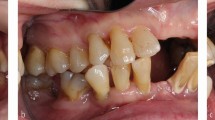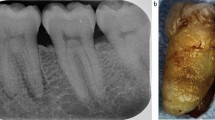Key Points
-
This study suggests that a relatively small proportion of care delivered can be defined as 'complex restorative treatment'.
-
There is considerable potential for delegation of care to dental hygienists and therapists.
-
The findings assume that all the care currently provided is clinically necessary and appropriate.
-
Further work is required on the economic aspects of employing dental hygienists and therapists in general dental practice.
Abstract
This study describes the proportion and volume of work undertaken in primary dental care that could be delegated to hygienists and therapists.
Methods Data on treatment provision, both NHS and private, over one course of treatment for 850 consecutively attending patients at 17 dental practices, selected to be representative of a range of socioeconomic, urban and rural environments, were extracted from case records.
Results The 850 patients attended on 2,433 occasions. Diagnostic examination accounted for 833 (34.2%) visits, while simple, intermediate and complex restorative interventions and other complex interventions accounted for 500 (20.5%), 361 (14.8%), 365 (15%) and 374 (15.4%) visits respectively. The total time required to provide the care was 42,800 minutes, of which 6,550 (15.3%) were devoted to diagnostic examinations, while 10,485 (24.5%), 7,935 (18.5%) and 11,790 (27.5%) were taken up with simple, intermediate and complex restorative care. Other complex interventions accounted for 6,040 (14.2%) minutes. Assuming that dental therapists are permitted to undertake simple and intermediate restorative interventions, they could provide 35.3% of care when number of visits is utilised as the outcome measure, but 43% of the clinical time taken to provide care. Delegation of diagnostic and treatment planning powers to dental therapists could potentially result in 69.5% of visits and 58.3% of clinical time being provided by therapists.
Conclusion These data imply that a considerable proportion of work in UK general dental practice could be delegated to dental hygienists and therapists.
Similar content being viewed by others
Log in or create a free account to read this content
Gain free access to this article, as well as selected content from this journal and more on nature.com
or
References
Nuffield Foundation. Education and training of personnel auxiliary to dentistry. London: Nuffield Foundation, 1993.
General Dental Council. Dental auxiliaries review group. Report on the future of professionals complementary to dentistry. London: General Dental Council, 1998.
Department of Health. Modernising NHS dentistry: implementing the NHS plan. London: Department of Health, 2000.
Department of Health. NHS dentistry: options for change. London: Department of Health, 2002.
The United Kingdom Parliament. The Dental Auxiliaries (Amendment) Regulations 2002. London: Her Majesty's Stationery Office, 2002.
General Dental Council. DCP registration draft rules consultation. London: General Dental Council, 2006. Available at http://www.gdc-uk.org
The United Kingdom Parliament. The Dental Auxiliaries Regulations 1986. London: Her Majesty's Stationery Office, 1986.
Harris R V, Haycox A . The role of team dentistry in improving access to dental care in the UK. Br Dent J 2001; 190: 353–356.
Welsh Assembly Government Statistical Directorate. Welsh index of multiple deprivation 2005. Cardiff: Welsh Assembly Government, 2005. Available at http://www.lgdu-wales.gov.uk/eng/WimdProject.asp?id=1758
Office for National Statistics. Adult dental health survey: oral health in the United Kingdom 1998. London: Office for National Statistics, 2000.
Beaufort Research. Wales omnibus survey, June 2006. Cardiff: Beaufort Research, 2006.
Audit Commission. Primary dental care services in England and Wales. London: Audit Commission, 2002.
Chestnutt I G, Kinane D F . Factors influencing the diagnosis and management of periodontal disease by general dental practitioners. Br Dent J 1997; 183: 319–324.
Jenkins W M M, Kinane D F . The “high risk” group in periodontitis. Br Dent J 1989; 167: 168–171.
National Institute for Clinical Excellence. Dental recall: recall interval between routine dental examinations. London: National Institute for Clinical Excellence, 2004.
Harris R, Burnside G . The role of dental therapists working in four personal dental service pilots: type of patients seen, work undertaken and cost-effectiveness within the context of the dental practice. Br Dent J 2004; 197: 491–496.
Holt R D . Cost-effectiveness study of therapists in general practice (comment on Harris and Burnside). Br Dent J 2004; 197: 477.
Galloway J, Gorham J, Lambert M et al. The professionals complementary to dentistry: systematic review and synthesis. Oxford: Centre for Evidence Based Dentistry, 2002.
Gallagher J L, Wright D A . General dental practitioners' knowledge of and attitudes towards the employment of dental therapists in general practice. Br Dent J 2003; 194: 37–41.
Author information
Authors and Affiliations
Corresponding author
Additional information
Refereed paper
Rights and permissions
About this article
Cite this article
Evans, C., Chestnutt, I. & Chadwick, B. The potential for delegation of clinical care in general dental practice. Br Dent J 203, 695–699 (2007). https://doi.org/10.1038/bdj.2007.1111
Published:
Issue date:
DOI: https://doi.org/10.1038/bdj.2007.1111
This article is cited by
-
Advancing Dental Care - Utilising the dental therapist workforce to optimise patient outcomes
BDJ Team (2022)
-
The perceptions and attitudes of qualified dental therapists towards a diagnostic role in the provision of paediatric dental care
British Dental Journal (2022)
-
Needs-led human resource planning for Sierra Leone in support of oral health
Human Resources for Health (2021)
-
The dental therapist's role in a 'shared care' approach to optimise clinical outcomes
BDJ Team (2021)
-
The dental therapist's role in a 'shared care' approach to optimise clinical outcomes
British Dental Journal (2021)



